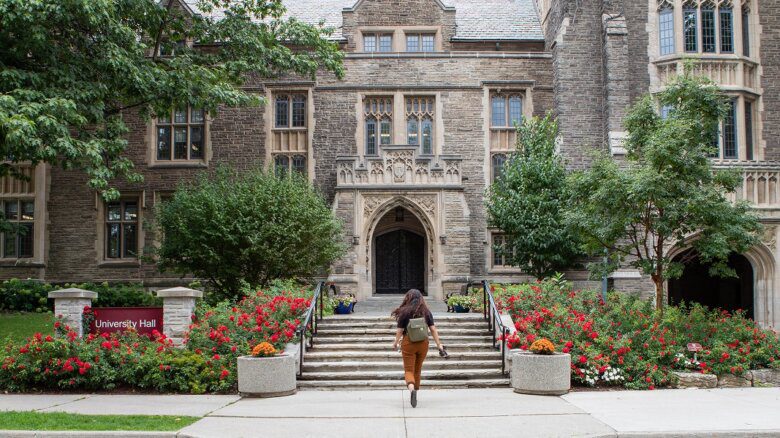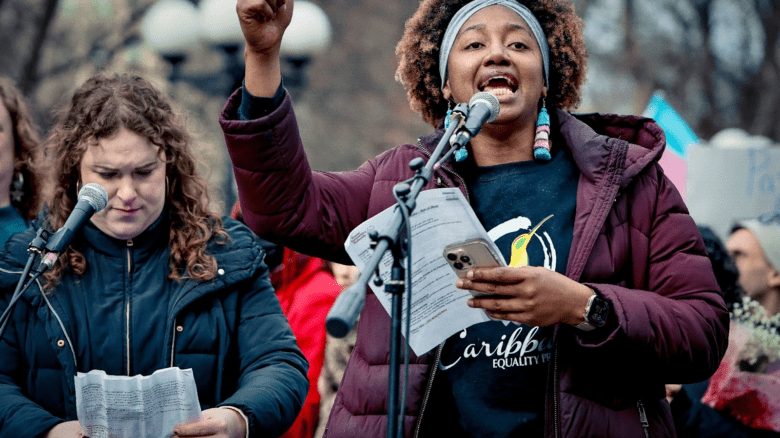“Ask Kai: Advice for the Apocalypse” is a column by Kai Cheng Thom to help you survive and thrive in a challenging world. Have a question? Email askkai@xtramagazine.com.
Dear Kai,
Lately, I’ve been going through some deep soul-searching about money and class. I’m a mixed-race East and South Asian person, and I grew up in a family that is descended from an indentured worker background. Growing up, we were always struggling financially. I got involved in social movements both because of my class background and my queerness (my racial consciousness came later on). My parents had a “model minority” mentality, always encouraging me to pursue education, make money and get ahead, but I always pushed back against this kind of capitalist mindset. I did end up going to law school, but always worked in non-profit advocacy positions, mostly for migrant workers.
Long story short, I did that for a bunch of years, as well as volunteer activism on the side. I got burned out. I know I did some good work that helped people, but for every success it seemed like there were a bunch more failures. And there was so much conflict and infighting in the activism and advocacy world. Eventually I just couldn’t take it anymore—it was ruining my mental health and my relationship with my partner, so I quit. I took a bunch of time off, and then I had to work again to pay the bills. When I returned to work, I took a government job, and I make way more money than I ever thought I would. I have benefits and a work-life balance—but the work is in opposition to my politics. At best, it’s meaningless bureaucracy, and at worst, the work we do might actually be harmful to marginalized communities. I try to use my position to minimize the harm, but you know how these things are. It’s all a giant machine, and I’m a part of it.
I think about going back to advocacy work all the time, but I actually just can’t stomach it. I get anxious just thinking about it. And the truth is, I like having more money and stability. Everything was a struggle before, and now it’s easier. I can take care of myself and my partner now, and I don’t want to give that up. I feel awful saying it, but it’s true. I can’t really talk about this with my activist friends, because I know they wouldn’t understand, and when I talk about it with my non-activist friends, they basically just tell me I have to look out for number one, which isn’t helpful. Am I an awful person? Have I sold my soul? What can I do to live according to my values, but to also have a sustainable work-life balance?
Compromised in Capitalism
Dear Compromised,
I don’t think that you’re an awful person. I think that you’re a human being who, like all of us, has been forced to make terrible choices within a system that is designed to crush our spirits and make us choose between our ethics and our survival. Caught in the jaws of that terrible choice, we all come face to face with shadow selves, the parts of ourselves that are self-serving and unethical—whether we admit it or not. And every one of us, at some point in our lives, will make a choice that we are not entirely proud of, that harms other people or that compromises our belief in our own goodness.
This is the inevitable, painful reality of being an adult under global capitalism, and I don’t believe that any of us can make it through with entirely clean hands. What we can do is practise ongoing consciousness of the harms that we do commit and try to reduce or offset them through a commitment to good actions that uplift not only others, but ourselves as well. We do not have to sacrifice ourselves as martyrs to the cause of social justice (I don’t believe that this is either healthy or an effective means of creating social change). Nor should we just surrender and become unbridled participants in capitalism without a care in the world for the people outside our immediate social scene. Rather, we have to pace ourselves and develop a strong emotional—even spiritual—awareness of the long-term struggle that is trying to live an ethically good life in an unjust world. I truly believe that this is the great spiritual struggle of our times, Compromised. We need to stay engaged, optimistic, in touch with the good and hope that is still possible. We are not defeated yet.
It is a popular fallacy that any of us can live under late-stage capitalism without moral compromise, but it is also a popular fallacy that deliberately subjecting ourselves to suffering is the only way for a socially conscious person to maintain any semblance of a moral life. A lot of us in the advocacy, activism and non-profit worlds have been conditioned to equate deprivation, overwork and high-stress lifestyles focused on providing care for other people with moral goodness while abundance, balance and rest are equated with excess and degeneracy.
This perspective is sneakily embedded in the ethos of many contemporary activist cultures, and results in many problems for both people and pro-social political transformation. In the first place, the systemic impact of a “suffering is morally good” perspective is that it obscures the basic fact that all individuals deserve access to leisure, pleasure and non-scarcity, and in fact, this is the point of an anti-capitalist movement. Moreover, the idea that we should sacrifice ourselves to low-pay, high-stress, soul-destroying jobs in the name of moral goodness plays directly into capitalist and colonial hands; that is exactly what the system would like us to do.
I am saying all this to you, Compromised, precisely because I want to encourage the instinct that led you away from work that was burning you out and killing your soul. I want to encourage this for everyone: You deserve to be happy, and your happiness is a part of the revolution. A movement culture that demands we sacrifice our health and our happiness in the name of goodness will never take us to liberation. The struggle to live with integrity under capitalism begins—must begin—with a commitment to our own wellness.
The capitalist world is set up as a trap: when we prioritize our own pleasure, we are often confronted by situations that require us to exploit others.
Of course, the trouble with committing to our own wellness in a capitalist system is that the capitalist world is set up as a trap: when we prioritize our own well-being and pleasure, we are often confronted by situations that require us to either directly or indirectly exploit others in order to maintain our well-being. We all do this every single day, whether we are benefiting from unearned racial privilege in the job market, consuming foods that were grown and harvested by underpaid migrant workers, or living on lands that were stolen from Indigenous communities we do not belong to.
The scale and intensity of exploitation in the contemporary world is vast and overwhelming; it is inescapable. In activist communities, I often see what I perceive as a cycle of burnout and dissociation: intense efforts toward social change followed by an emotional collapse and drifting away from social movements. I’ve been through this cycle myself, several times, and I’m sure I will go through it again. I suspect that the trick is finding a way to stabilize our participation in social movements, taking a harm-reduction approach to the exploitation we inevitably benefit from and not allowing that to bring us past the brink of despair. This, again, requires a commitment to our wellness and self-care—not self-care like self-indulgently doing whatever we want to do without a thought to the consequences, but self-care like doing the physical and spiritual work necessary to stay healthy and to make intentional choices.
When we are physically and spiritually grounded in a foundation of wellness, we have the space and capacity to create thoughtful systems that guide our inevitable participation in capitalism. The activist friends and acquaintances I admire most are not the ones who sacrifice their lives and health for “the movement,” but rather the ones who have become so skillful at living that they are able to participate in social change efforts in a sustained, high-quality way over long periods of time.
I have noticed that these individuals tend to have found jobs and lifestyles that have space for ease and pleasure. Where their work might involve moral compromise, these people often have systems in place for wealth redistribution and reparations. This might involve donating a significant amount of their monthly income to grassroots community organizations, as well as spending volunteer time contributing to activist movements.
Of course, there are certain moral lines that shouldn’t be crossed in the pursuit of one’s own wellness under capitalism, no matter how much wealth or labour redistribution you do. I don’t think that I could admire a cop who donated 40 percent of their salary to racial justice, or a professional landlord who spent every weekend organizing for social housing.
There are some jobs and situations that you just have to walk away from to preserve your own integrity, and the scary thing is that at the end of the day, only you can decide where your own moral line is between “acceptable compromise” and “unacceptable hypocrisy.” It’s easy to fool ourselves into complacency, which is why refusing to slide into overwhelm is key: we have to be able to think clearly, feel appropriately and accurately assess the amount of harm that emerges from our major life choices—to see our capitalist “footprint,” as it were.
When it comes to your job, Compromised, I guess I would want to ask: What are the specific harms to marginalized people that come from your work? What is the severity and the impact on real, living people on the ground? Is it something that you can hope to significantly change, reduce or offset from your position as an individual? Or is it so much harm that you won’t be able to live with yourself later if you don’t leave?
I believe that we know when our jobs are so terrible for humanity that we must leave them in order to be in integrity with ourselves, Compromised. I believe that this is usually painfully obvious, so long as we are willing to do the work of actually opening our hearts to true awareness of our impact in the world. It’s the rest of the jobs that are harder to know what to do with: those that are mostly neutral, perhaps engaged in low-level evil, soul-numbing activities, but not terribly villainous in and of themselves. What are we to do with jobs like that?
In the first place, I’d suggest finding ways to make your life exciting, meaningful and connecting to justice outside of work. Use the stability and financial cushion offered by your work to revitalize yourself and rediscover activism in a way that feels really joyful to you. We aren’t defined by our jobs, or by our forced relationships to labour. Perhaps, then, there might be opportunities to re-evaluate your professional work. Do you want to go back to school? Start a new career? Or is it actually enough to stay where you are and work toward social good outside of the professional sphere? You deserve to be happy, Compromised—not happy in the sense of comfortably dissociated from reality, but rather truly flourishing in the spiritual sense of the word. The wisest people I know are deeply connected to justice, but also to fun, to adventure, to meaningfulness. No, none of us are truly free under capitalism. But I believe we can still find ways to better lives through creativity, tenacity and subversive action—queer history teaches us that. Hold on to joy, Compromised. That’s what the revolution is for.
Kai Cheng Thom is no longer a registered or practicing mental health professional. The opinions expressed in this column are not intended or implied to be a substitute for professional medical advice, diagnosis or treatment. All content in this column, including, but not limited to, all text, graphics, videos and images, is for general information purposes only. This column, its author, Xtra (including its parent and affiliated companies, as well as their directors, officers, employees, successors and assigns) and any guest authors are not responsible for the accuracy of the information contained in this column or the outcome of following any information provided directly or indirectly from it.


 Why you can trust Xtra
Why you can trust Xtra


